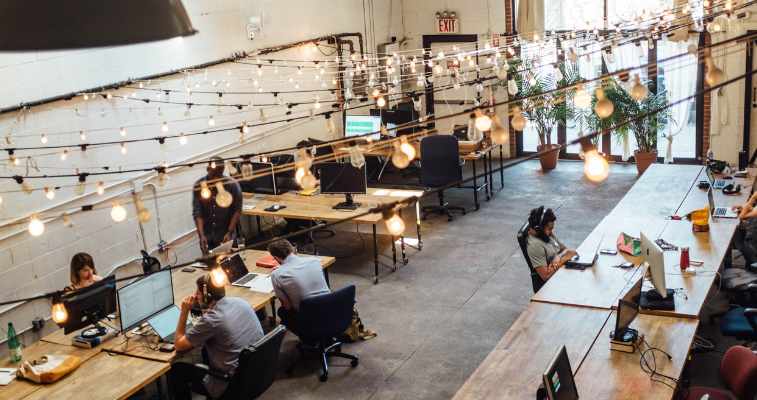The Evolution of Workspaces
In the not-so-distant past, workspaces were characterized by rows of cubicles and rigid schedules. However, the rapid advancement of technology and a changing work culture have led to a profound transformation in the way we work. Central to this shift is the rise of co-working spaces, which are redefining the traditional concept of offices.
Co-Working Spaces Defined
Co-working spaces represent flexible and shared work environments where professionals from diverse backgrounds and industries come together to work, collaborate, and innovate. These spaces offer an array of options, from private offices to communal areas, meeting rooms, and event spaces, catering to the multifaceted needs of today’s workforce.
Why Co-Working Spaces Are Thriving
The phenomenal growth of co-working spaces can be attributed to several compelling factors that resonate with the changing nature of work:
Flexibility and Affordability
Co-working spaces have disrupted the conventional office leasing model by offering flexible membership options. This allows individuals and businesses to scale their workspace requirements up or down as needed, eliminating the burdens of long-term commitments and high overhead costs.
Community and Networking
Co-working spaces create a unique sense of community and foster collaboration. With a diverse mix of professionals working under one roof, these spaces become hubs of innovation and networking. Chance encounters often lead to meaningful connections and unexpected opportunities.
Amenities and Services
Beyond just providing desks, co-working spaces offer a comprehensive package of amenities. High-speed internet, printing facilities, well-equipped kitchen areas, and quality coffee services are commonly available. This level of service allows members to focus on their work, while the space management takes care of the rest.
Location and Accessibility
Many co-working spaces strategically position themselves in urban centers, ensuring easy access to transportation, dining options, and entertainment. The convenience of these locations enhances work-life balance and reduces the time and stress of commuting.
The Co-Working Experience
Entering a co-working space is not just about securing a desk; it’s about becoming part of a dynamic community. Here’s what you can expect from the co-working experience:
- Diverse Work Areas: Co-working spaces offer a range of working environments, from quiet, focused zones to collaborative spaces designed to encourage interaction and innovation.
- Event Spaces: These spaces often include dedicated areas for workshops, seminars, and other events, making it easier to host or attend professional gatherings.
- Meeting Rooms: Whether you need a space for client meetings or team discussions, co-working spaces typically provide bookable meeting rooms equipped with essential technology.
- Fully Equipped Kitchen: Communal kitchen areas provide a space to enjoy meals and snacks. Sharing a meal with fellow co-workers often leads to valuable connections and collaborations.
- Community Managers: Many co-working spaces employ community managers who serve as dedicated points of contact for assistance and community-building. They play a crucial role in creating a sense of belonging among members and ensuring the seamless operation of the space.
Photo by Thirdman: https://www.pexels.com/photo/a-group-of-people-having-a-meeting-in-the-office-7652040/
Comparative Analysis: Traditional Office vs. Co-Working Space
Let’s explore a detailed comparison between a traditional office and a co-working space to highlight the significant distinctions:
| Aspect | Traditional Office | Co-Working Space |
|---|---|---|
| Fixed Leases | Traditional offices often involve long-term leases and commitments. | Co-working spaces offer flexible, month-to-month memberships, allowing for scalability and cost-effectiveness. |
| Isolation | Traditional offices can be isolating, with limited interaction. | Co-working spaces thrive on community and networking, fostering collaboration, and serendipitous connections. |
| Cost | Traditional offices come with high overhead, including rent, utilities, and maintenance costs. | Co-working spaces are cost-effective, offering inclusive amenities like internet, utilities, and cleaning services. |
| Customization | Traditional offices offer limited flexibility in terms of office design and layout. | Co-working spaces allow for personalized workspace options, catering to individual or team preferences. |
The Future of Co-Working Spaces
Co-working spaces have not merely emerged as a trend; they have become an integral part of the modern work landscape. As remote work continues to gain prominence, co-working spaces will evolve to meet the ever-changing needs of professionals. Here’s what the future might hold:
Advanced Technology Integration
Expect to see enhanced tech solutions that facilitate seamless remote collaboration, making virtual meetings and teamwork more efficient and productive.
Enhanced Wellness Facilities
Co-working spaces are likely to incorporate health and wellness amenities, promoting a holistic work experience. This could include meditation rooms, fitness areas, and wellness programs to ensure well-being while working.
Expansion to Suburban Areas
Co-working spaces will no longer be confined to bustling urban centers. The expansion into suburban areas will provide quieter, more accessible work environments for those who prefer a different setting.
Increased Industry Specialization
To cater to the specific needs of various professions and industries, co-working spaces may become more specialized. These tailored spaces will ensure that professionals can work in an environment designed to enhance their unique work requirements.
Conclusion
In conclusion, co-working spaces are redefining the traditional concept of offices, offering a flexible, dynamic, and cost-effective alternative. They provide an environment that encourages community, networking, and innovation, making them the preferred choice for an ever-evolving workforce.
Join the movement and experience the transformation of workspaces firsthand. Whether you’re an entrepreneur, freelancer, or a corporate professional, co-working spaces are designed to cater to your ever-changing needs. Welcome to the future of work, where adaptability and collaboration reign supreme in a world that’s constantly evolving.




